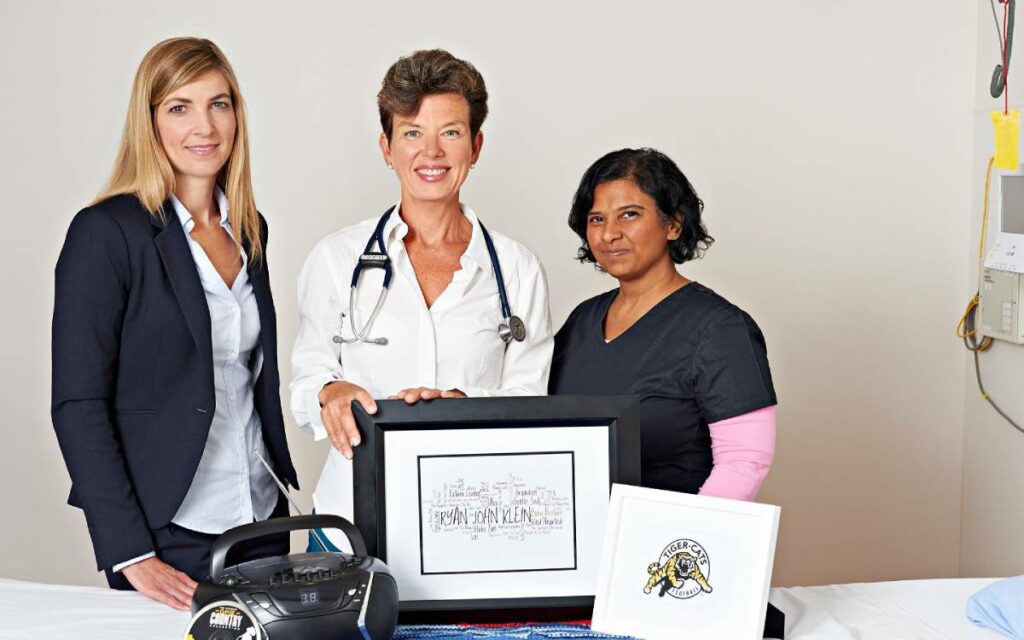
Since 1959, 402 scientists have received a Canada Gairdner Award and 96 have gone on to receive the Nobel Prize. Dr. Cook (pictured, centre) was given the 2022 Wightman Award “for pioneering research that has developed and defined evidence-based critical care medicine in Canada, informing best practices around the world.” Photo credit: Twitter/St. Joseph’s Healthcare Hamilton
Earlier this month, the Gairdner Foundation announced its 2022 Canada Gairdner Award laureates, recognizing some of the world’s most significant biomedical and global health research and discoveries.
The foundation grants seven awards annually: five Canada Gairdner International Awards for biomedical research, one John Dirks Canada Gairdner Global Health Award, specifically for impact on global health issues, and one Canada Gairdner Wightman Award, reserved for a Canadian.
This year’s Wightman Award recipient was renowned scientist and Hamilton native Dr. Deborah J. Cook.
A critical care physician at St. Joseph’s Healthcare Hamilton, distinguished professor of medicine at McMaster University, fellow at the Royal Society of Canada, and officer of the Order of Canada, Dr. Cook was given the highly prestigious award “for pioneering research that has developed and defined evidence-based critical care medicine in Canada, informing best practices around the world.”
“Canadian scientists remain an example to follow as they continue to lead in global health research and discoveries that help create a more resilient society, country, and world,” said Canada’s Minister of Health Jean-Yves Duclos in a statement announcing the winners.
“Congratulations to this year’s Canada Gairdner Award recipients, your work demonstrates the power of science to improve lives and solve major challenges facing humanity.”
Considered the “foremost authority in critical care medicine and health research methodology”, Dr. Cook’s three decades of contributions to the design and conduct of practice-changing clinical studies have led to major improvements in the care of hospitals’ sickest patients.
In 2013, she co-created the internationally adopted ‘3 Wishes Project’. The unique inter-professional model of end-of-life care encourages clinicians with different backgrounds to improve the dying experience for hospitalized patients by honouring their lives, easing family grief, and fostering humanism in practice.
Dr. Cook was also a founding member of the first successful critical care research collaboration in the world – the Canadian Critical Care Trials Group – which flourished under her leadership as chair and champion of patient-centred investigator-initiated research.
According to the Gairdner Foundation, Dr. Cook’s research has helped to alleviate the enormous human and economic costs of critical illness for patients, families, healthcare systems and society.
Dr. Cook has designed and conducted several landmark national and international studies on how best to prevent common and often lethal complications of critical illness such as blood clots, lung infections, and gastrointestinal bleeding, providing key evidence for reviews and guidelines used at the bedside worldwide. She has passionately improved the field of critical care, saving lives in the ICU and impacting critical care practice across the globe.
Over her career, Dr. Cook has garnered dozens of national and international honours.
Her research focuses on creating measurable health, social and economic benefits for patients needing advanced life support and has transformed critical care medicine and has had an enduring global impact on patients, practice, and policy.
The Gairdner Foundation was established in 1957 by Toronto stockbroker James Gairdner. Since 1959 when the first awards were granted, 402 scientists have received a Canada Gairdner Award and 96 to date have gone on to receive the Nobel Prize.






